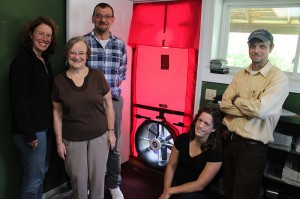
In states such as Kentucky and South Carolina, electric cooperatives are pursuing ways to reduce their members energy costs. But the government shutdown is affecting the funding outlook for energy efficiency programs nationwide. Photo by KFTC.
While many rural electric cooperatives are waiting eagerly for the government to get back to work, others are moving forward on energy efficiency.
While some rural electric cooperatives are large and have the ability to provide valuable services to their customers, others are smaller, cash-strapped, and face administrative and financial challenges on a daily basis.
To reduce electricity costs for the customers, some co-ops look to federal funding to support programs that they see as beneficial to their customers.
The general consensus among co-ops is that federal funds are a vital source of support for providing reliable electricity and helping their customers pay their electricity bills — especially in rural areas where those bills tend to be higher and constitute a greater portion of a family’s income.
A recent article on Electric Coop Today describes how the delay in passing a federal Farm Bill was hurting the ability of co-ops to provide low-cost loans to customers for energy efficiency improvements.
The article stated that the government shutdown was further impeding a critical Farm Bill program called the Rural Energy Savings Program. According to the article, this program would “enable coops to take a lead role in saving energy and creating jobs in rural America through loans to members to offset the high upfront cost of efficiency upgrades.” Fortunately, Farm Bill talks are ramping up despite the current shutdown.
On the other hand, the shutdown has prevented the U.S. Department of Agriculture from finalizing the Energy Efficiency and Conservation Loan Program, which is designed specifically to support new efficiency programs for co-ops.
While the Rural Energy Savings Program and Energy Efficiency Conservation Loan Program could benefit co-ops across the U.S. by providing funding for coops to create or ramp-up loan programs for residential energy improvements, some co-ops aren’t waiting for the political dust to settle before creating their own programs.
Roanoke Electric Cooperative, in partnership with Environmental Defense Fund and Generations Community Credit Union, created a low-cost loan program using private capital that offers loans of up to $4,000 for residential customers at a 3.5 percent interest rate. The program will help Roanoke’s customers, many of whom live in energy-inefficient manufactured homes, significantly reduce their energy costs. As noted by Greg Andeck, Manager of the North Carolina Utilities Program at Environmental Defense Fund, “The loan is paid back on the monthly utility bill, reducing paperwork for homeowners and making repayment easier.”
The program is the first such program to be created in North Carolina. Similar models, however, have already been created or are in the process of expanding in Massachusetts, South Carolina, Kansas, Kentucky and other states across the U.S. These programs can save residential customers more than 20 percent on their annual electricity bills.
South Carolina’s “Help My House” pilot residential energy efficiency loan program developed by Central Electric Power Cooperative, the Electric Cooperatives of South Carolina and other partners financed comprehensive energy efficiency improvements for 125 homes. The program, which targeted homes with extremely high energy costs, resulted in an average 36 percent reduction of those costs.
As described in the program’s summary report, one such home, owned by Teri and John Norsworthy — a retired couple living on fixed incomes — received a loan of $6,540 to significantly improve the efficiency of their home. Their home is now more comfortable year-round than it had been previously, and their electricity costs were reduced by an average of more than $150 per month.
Unfortunately, while such energy efficiency loan programs seem like a no-brainer for rural electric co-ops and for rural America in general, it is not always easy for a co-op to find a private financial institution that will finance a comprehensive residential energy efficiency program. This highlights the importance of federal funding options for many co-ops who want to help their customers save money.
Let’s hope that Congress realizes the importance of getting back to work and passing legislation that would authorize the funding necessary to help co-ops and their customers reduce their energy costs.



Leave a Reply